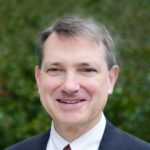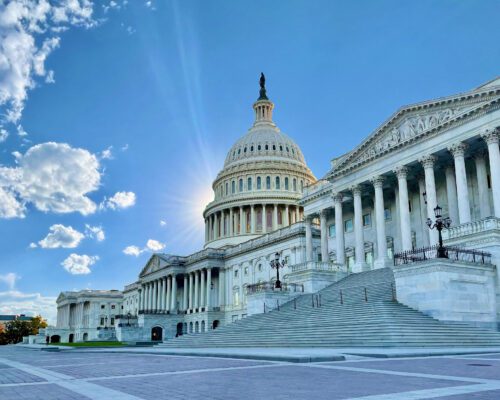The full-time presence in Washington, D.C., of Southern Baptists’ public policy entity is a recent development historically, but it has become a vital part of the convention’s engagement with the federal government.
Today, the Ethics and Religious Liberty Commission (ERLC) represents Southern Baptists from Leland House on Capitol Hill. Almost 34 years after its first full-time Washington staff member came on board, the Commission continues to speak on behalf of Southern Baptists to Congress, the White House, and the U.S. Supreme Court.
The ERLC’s main office is in Nashville, Tennessee, but its work and building in Washington have been integral in communicating to federal policymakers where Southern Baptists stand on vital issues.
“The ERLC has a unique calling to serve Southern Baptists on issues of religious freedom, the sanctity of human life, marriage and family, and human dignity,” said President Brent Leatherwood, unanimously elected in 2022 as the ninth head of the Commission. “It’s through the work of remarkable men and women in our Leland House that we are able to carry out that mission.
“I am eager to witness what we will accomplish together through our advocacy in Washington in the years ahead.”
Founded in 1845, the SBC can trace its moral concerns work by means of a formal organization as far back as 1908. Despite the convention’s lengthy record of addressing moral concerns, it still had no full-time presence in Washington for 80 years.
Early Days in the Washington
That changed in 1989.
The year before, Richard Land had become the seventh executive director (later changed to president) of what was then known as the Christian Life Commission (CLC). His election the result of the SBC’s Conservative Resurgence, Land came with a commitment to guide the Commission in a fully pro-life direction and with the recognition a permanent voice in the capital was needed. Previously, CLC staff in Nashville would travel to Washington on occasion. The SBC had urged the Commission in 1987 to open an office in the capital.
“We had to have people in Washington to talk to the congressmen, to be able to talk to them on a daily basis,” Land said in recalling that early step in his 25-year administration.
James A. Smith Sr., who was working for a committee in the House of Representatives, became the CLC’s first full-time staff member in 1989.
The Commission, however, was prohibited from addressing religious freedom issues because of the SBC’s relationship with the Baptist Joint Committee (BJC) on Public Affairs, now the Baptist Joint Committee for Religious Liberty. The BJC addressed church-state issues on behalf of several Baptist organizations. The SBC was the committee’s largest financial supporter.
“So here we were faced with the impossible task of encouraging people to be Christian citizens, encouraging them to be involved in Christian citizenship but without being able to talk about the Baptist understanding of that with the religious liberty perspective,” Land recalled.
The SBC solved that problem by 1990. Continuing disagreement with some of the BJC’s actions on church-state issues prompted the messengers to that year’s meeting to grant the CLC the authority to advocate for religious liberty on behalf of the SBC. They also transferred more than $340,000 of the convention’s financial support of the committee to the CLC. Messengers eliminated all giving to the BJC the next year and cut all ties to the committee in 1992.
Expanding its work
Freed from its former limitation and with a larger staff beginning in 1990, the CLC expanded its work in the capital. For instance, it became an important member of a diverse coalition in support of the Religious Freedom Restoration Act, which became law in 1993 and remains a vital protection against government discrimination.
The CLC’s advocacy in opposition to abortion became a priority of its public policy work. Under Land’s leadership, the Commission became an outspoken voice for the preborn and their mothers. SBC messengers had adopted a series of strong pro-life resolutions beginning in 1980. The actions by the SBC and the CLC marked a reversal of pro-choice resolutions in the 1970s and pro-choice advocacy by a previous commission head.
“[T]he pro-life issue was such a key, driving force behind the desire of Southern Baptists to have their voice heard in Washington,” Smith said. “[B]ecause of [our] history, Southern Baptists wanted to make clear that we had come to understand this issue and had come to put ourselves in lockstep with the pro-life movement.”
It was important to have “someone in Washington on a regular basis who could say, ‘Southern Baptists have said over and over again that we believe life begins at conception and that legislation should be pursued to that end’” with the recognition the Supreme Court needed to overturn Roe v. Wade, he said.
“All of that was only possible with a full-time Washington office to speak to those issues.”
A permanent presence
The ERLC has carried out its SBC assignment since 1994 from its permanent office at Leland House. The building, a three-level townhouse on the Senate side of Capitol Hill, is named in honor of John Leland, a Baptist pastor in Colonial America who was instrumental in helping secure religious freedom in the U.S. Constitution’s First Amendment.
While leasing space in an office building on Capitol Hill, the Commission received $300,000 from the SBC Executive Committee in 1993 to buy its own building. That money, which helped pay for the purchase and renovation of the townhouse, came from capital funds set aside in 1964 for “public affairs” in Washington.
“The Leland House has played a vital role in our work in Washington, D.C., for many years, providing a singular home for our work on matters of public policy,” Leatherwood said. “It is a great building and serves as a vivid reminder of God’s faithful provision to our organization, as well as a representation of the ERLC’s steady presence in our nation’s capital.”
The work of the Commission’s Washington office has included meeting with members of Congress and their staffs, filing and signing onto friend of the court briefs with the Supreme Court, expressing concerns to presidential administrations in person and by public comments, and working in coalitions on a variety of policies. The Commission also has hosted numerous conferences and panel discussions in Washington to further the policy priorities of Southern Baptists.
The issues the Commission’s staff in Washington has addressed in response to SBC convictional expressions have been varied. In addition to abortion and religious liberty, the ERLC has communicated with policymakers regarding such matters as criminal justice reform, gambling, LGBTQ+ rights, human trafficking, immigration, physician-assisted suicide, pornography, predatory payday lending, refugee resettlement, and religious persecution globally.
The gains supported by the ERLC have included the enactment of the International Religious Freedom Act (1998), Trafficking Victims Protection Act (2000), Partial-birth Abortion Ban Act (2003), First Step Act (2018), and Uyghur Forced Labor Prevention Act (2021). The Supreme Court has issued a series of opinions in support of religious freedom, as well as the monumental reversal last year of Roe.
“[I]t is important to have a Washington presence,” Land said. “It would have been much more difficult for us to do some of the things we’ve done, to have some of the influence we’ve had had we not had a Washington office.”










